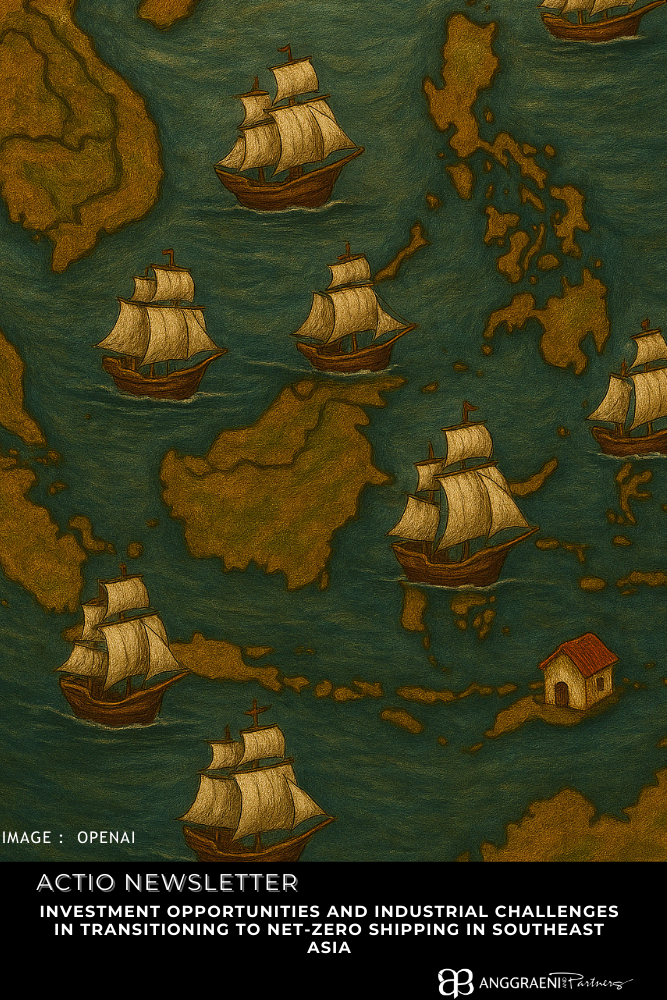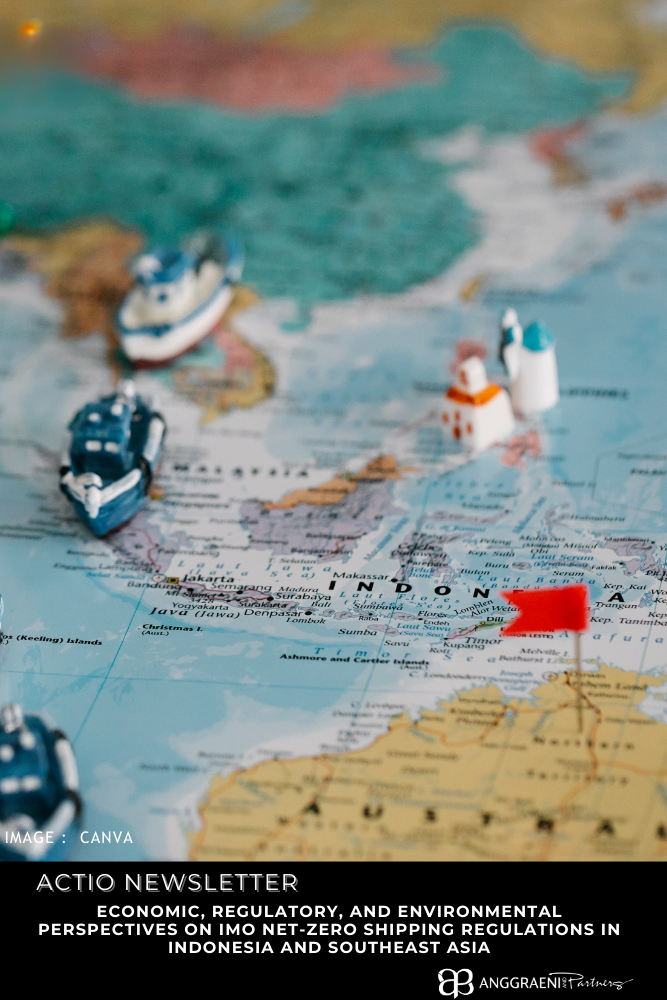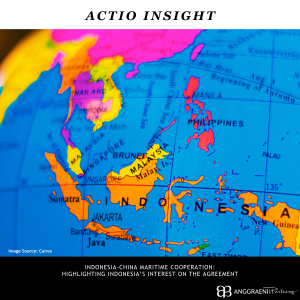INDONESIA-CHINA MARITIME COOPERATION: HIGHLIGHTING INDONESIA’S INTEREST ON THE AGREEMENT
by Setyawati Fitri Anggraeni, Orima Davey, Christou Imanuel, Alicia Daphne Anugerah*
Overview of the Agreement
Not long after his inauguration, President Prabowo Subianto has paid a visit to People’s Republic of China, where he and President Xi Jinping agreed to establish a friendly diplomatic coordination on several critical issues. Some of the issues covered by this Memorandum of Understanding (MoU) are economic stability, geopolitical safety, and maritime fishing. In addition, both China and Indonesia agreed to add one extra pilar on their existing four-pillars of their agreement. The existing four pillars: political, economic, people-to-people and maritime – have now been joined by a fifth: security. The political pillar dictates both states to strengthen their national security and political integrity. In this MoU, Indonesia reaffirms the PRC’s position on the one China policy on the Taiwan, Xinjiang, and Xizang issue. The economic pillar dictates both states to safeguard the WTO- centered multilateral trading system, work to promote a fair, equitable and non-discriminatory trade and investment environment, reject decoupling or disaggregation of supply chains, oppose all forms of unilateralism and trade protectionism, and trade protectionism, and will work together to safeguard the legitimate rights and interests of developing and interests of developing members of the WTO. In this MoU, China expressed its welcome to Indonesia’s plan to open a Consulate General in Chengdu. In order to pursue their economic interest, Indonesia and China are keen to implement the Regional Comprehensive Economic Partnership (“RCEP”). Further, both states confirmed the importance of maintaining stable and smooth industrial and supply chains and their opposition to the establishment of discriminatory and exclusionary rules. Indonesia also restates their interest and support for intergovernmental organization of Brazil, Russia, India, China, and South Africa (“BRICS”).
Both Indonesia and China also highlight the importance of developing educations by providing several kinds of scholarships, improving Chinese and Indonesian language proficiency, digital education, and talent cultivation, especially STEM. In the pillar of maritime, both China and Indonesia agreed to make China-Indonesia Maritime Cooperation Fund. China and Indonesia will work to enhance cooperation in marine scientific research and environmental protection, maritime safety and security, deep-sea exploration, disaster prevention and mitigation, and maritime capacity building. China supports Indonesia’s efforts to implement a clean energy transition and will engage in significant cooperation with Indonesia to implement a clean energy transition. As for the additional pilar, security, both states are looking forward to fostering high-level military-to-military exchanges, enhance defense dialogue mechanisms and systematically promote cooperation at all levels and in all fields. The two states will continue to increase military-to-military visits, conduct joint exercises and training, hold the first joint military exercise on humanitarian assistance and disaster relief, and promote communication between military academies and think tanks.
Background of Indonesia-China Joint Statement
Both Indonesia and China agree that maritime poses as a crucial aspect of their cooperation. The realization of maritime cooperation emerged through fishery industrial chain, encompassing fishing, aquaculture, processing, investment and technology, and jointly promote the conversation and sustainable utilization of fishery resources. China has expressed its support for Indonesia’s efforts to strengthen its integrated fisheries sector and its capacity and capability in the maritime sector. In addition, both states committed to implementing the Declaration on the Conduct of Parties in the South China Sea (“DOC”) and to concluding a Code of Conduct (“COC”) at an early date based on consensus building to collectively maintain peace and stability in the South China Sea.
Indonesia’s Stance in the Agreement
The national security of a state rest with its understanding of and ability to use all of its sources and means of power, including political, diplomatic, economic, social, cultural, intellectual, informational, and military. Indonesia and China reaffirm their mutual support to the sovereignty, territorial integrity, and national security of both countries. Both sides emphasize the right to safeguard these principles and maintain independence from external interference. China resolutely supports Indonesia’s national unity and territorial integrity. Indonesia reiterates its consistent adherence to one-China principle, which is reaffirmed by the UN General Assembly Resolution 2758, and its recognition that the Government of the People’s Republic of China is the sole legal government representing the whole of China and that Taiwan is a inalienable part of China and firmly supports the Chinese Government’s efforts to achieve peaceful national reunification. Indonesia considers issues related to Xinjiang and Xizang as internal affairs of China and firmly supports China’s efforts to maintain development and stability in Xinjiang and Xizang. Both sides reaffirmed their commitment to the full and effective implementation of the Declaration on the Conduct of Parties in the South China Sea (DOC), and early conclusion of a code of conduct (COC) based on consensus building, to jointly safeguard peace and stability in the South China Sea.
DOC itself is a document agreed by ASEAN Countries and China in 2002. It includes agreement on the commitment to conduct all discussions, negotiations, and interaction aligned with the principles in United Nations Conference on the Law of the Sea (UNCLOS) and several other treaties and principle recognized by international law. These commitments stem from the willingness to interact with peace and refrain from the use of threats. It emphasizes the Parties’ commitment to fostering cooperation despite unresolved disputes. It encourages joint efforts in areas of shared interest, such as marine environmental protection, marine scientific research, safety of navigation, search and rescue operations, and combating transnational crimes, including piracy and trafficking. These cooperative activities are designed to build trust and promote stability, with the modalities, scope, and locations of such initiatives to be mutually agreed upon before implementation. This commitment underscores a collective willingness to address common challenges while maintaining peace and fostering collaboration in the region. This agreement is not meant to resolve the dispute; hhowever, it plays a role in giving guidelines for the negotiations and interactions. Moreover, the parties are also on track to conclude the COC. This agreement aims to establish binding rules for managing disputes in the region. Talks on the COC date back to the 1990s but have faced challenges due to China’s reluctance to limit its expansive claims and ASEAN’s internal divisions as only four members are official claimants.
On July 13, 20233, ASEAN and China agreed on guidelines to accelerate COC negotiations during Indonesia’s chairmanship of ASEAN. While this marks progress, significant challenges remain, including defining the geographic scope, ensuring binding commitments, and addressing China’s violations to UNCLOS. The success of a meaningful COC depends on overcoming these obstacles and balancing power dynamics in the region, as China’s growing control risks rendering the agreement ineffective. The joint agreement between Indonesia and China clearly is in line with the goals and objectives from the DOC. It implements the objective of fisheries development and fisheries conservation. It will also boost the negotiations process of COC. This will work as a strong basis for mutual trust between China and Indonesia. This basis will be very beneficial for countries to speed up the process of COC. This will also be a testament of Indonesia and China’s eagerness to maintain peace in the region.
Another perspective is that both parties agreed upon bilateral defense and security cooperation which has been upgraded from four pillar to five pillar cooperation. Security defense in this sense is not limited to military fields only, but also mechanism in the fields of anti-narcotics, counterterrorism and immigration, strengthen law enforcement, security and counterterrorism cooperation, jointly combat transnational crimes including drug manufacturing, illicit drug trafficking, cross-border gambling, telecom and cyber fraud, and terrorism. Both sides agreed that these actions will contribute to regional peace and security. Both sides will strive to deepen cooperation on law enforcement capacity building, actively carry out training cooperation in relevant fields, strengthen mutual learning, and jointly improve the capacity of law enforcement
Besides the national security aspect, the joint statement also holds its attention to climate change. Indonesia as a developing country that relies on natural resources accommodated this joint statement to recognize climate change as a global challenge. This means that the joint statement is based on the principles of equity, common but differentiated responsibilities and respective capacities to fully implement the UN Framework Convention Climate Cange and the Paris Agreement, as well as the Sendai Framework for Disaster Risk Reduction 2015-2030. Both sides agreed to minimize the impacts for sustainable resilience. The joint also promotes balance between environmental issues and economic significance. This is very important for Indonesia to comprehend in their regulation, since China is known for its economic lead in global forum. Hopefully, this joint statement will present Indonesia numerous policies that would enhance environmental protection in Indonesia, while also strengthening its
As in current international commitment, both parties continued to advance mutually beneficial collaboration between the Belt and Road Initiative (BRI) and the ASEAN Outlook on the Indo-Pacific (AOIP). China reaffirmed its commitment to supporting ASEAN’s efforts to integrate the AOIP into regional frameworks and to implementing tangible projects and activities under its four key priorities: maritime cooperation, connectivity, the UN Sustainable Development Goals (SDGs) 2030, and economic and other potential areas of partnership. This collaboration aims to foster win-win outcomes while strengthening ASEAN-led mechanisms that promote mutual trust, respect, and shared benefits.
Concluding Remarks
In conclusion, the joint agreements and collaborations between Indonesia and China signify a strategic and forward-looking partnership, addressing critical aspects such as national security, maritime cooperation, economic growth, and environmental sustainability. The inclusion of a fifth pillar on security marks a significant enhancement of bilateral ties, broadening the scope of collaboration to encompass defense, counterterrorism, and law enforcement. Furthermore, commitments to sustainable fisheries, clean energy transitions, and climate change mitigation underscore the shared vision of fostering regional peace, stability, and prosperity. By aligning their initiatives with broader frameworks such as the Belt and Road Initiative (BRI), ASEAN Outlook on the Indo-Pacific (AOIP), and the Declaration on the Conduct of Parties in the South China Sea (DOC), both nations demonstrate a commitment to multilateralism and cooperative problem-solving. These agreements not only strengthen Indonesia-China relations but also contribute to the stability and development of the broader region, setting a robust foundation for future collaboration that prioritizes mutual trust, respect, and shared benefits.
Source: https://news.cgtn.com/news/files/Joint_Statement_between_China_and_Indonesia.pdf
DISCLAIMER :
This disclaimer applies to the publication of articles by Anggraeni and Partners. By accessing or reading any articles published by Anggraeni and Partners, you acknowledge and agree to the terms of this disclaimer:
During the preparation of this work, the author(s) may use AI-assisted technologies for readability. After using this tool/service, the author(s) reviewed and edited the content as needed for the purposes of the publication.
No Legal Advice: The articles published by Anggraeni and Partners are for informational purposes only and do not constitute legal advice. The information provided in the articles is not intended to create an attorney-client relationship between Anggraeni and Partners and the reader. The articles should not be relied upon as a substitute for seeking professional legal advice. For specific legal advice tailored to your individual circumstances, please consult a qualified attorney.
Accuracy and Completeness: Anggraeni and Partners strive to ensure the accuracy and completeness of the information presented in the articles. However, we do not warrant or guarantee the accuracy, currency, or completeness of the information. Laws and legal interpretations may vary, and the information in the articles may not be applicable to your jurisdiction or specific situation. Therefore, Anggraeni and Partners disclaim any liability for any errors or omissions in the articles.
No Endorsement: Any references or mentions of third-party organizations, products, services, or websites in the articles are for informational purposes only and do not constitute an endorsement or recommendation by Anggraeni and Partners. We do not assume responsibility for the accuracy, quality, or reliability of any third-party information or services mentioned in the articles.
No Liability: Anggraeni and Partners, its partners, attorneys, employees, or affiliates shall not be liable for any direct, indirect, incidental, consequential, or special damages arising out of or in connection with the use of the articles or reliance on any information contained therein. This includes but is not limited to, loss of data, loss of profits, or damages resulting from the use or inability to use the articles.
No Attorney-Client Relationship: Reading or accessing the articles does not establish an attorney-client relationship between Anggraeni and Partners and the reader. The information provided in the articles is general in nature and may not be applicable to your specific legal situation. Any communication with Anggraeni and Partners through the articles or any contact form on the website does not create an attorney-client relationship or establish confidentiality.
By accessing or reading the articles, you acknowledge that you have read, understood, and agreed to this disclaimer. If you do not agree with any part of this disclaimer, please refrain from accessing or reading the articles published by Anggraeni and Partners.
For further information, please contact:
WWW.AP-LAWSOLUTION.COM
P: 6221. 7278 7678, 72795001
H: +62 811 8800 427
Anggraeni and Partners, an Indonesian law practice with a worldwide vision, provides comprehensive legal solutions using forward-thinking strategies. We help clients manage legal risk and resolve disputes on admiralty and maritime law, complicated energy and commercial issues, arbitration and litigation, tortious claims handling, and cyber tech law.
S.F. Anggraeni
Managing Partner




